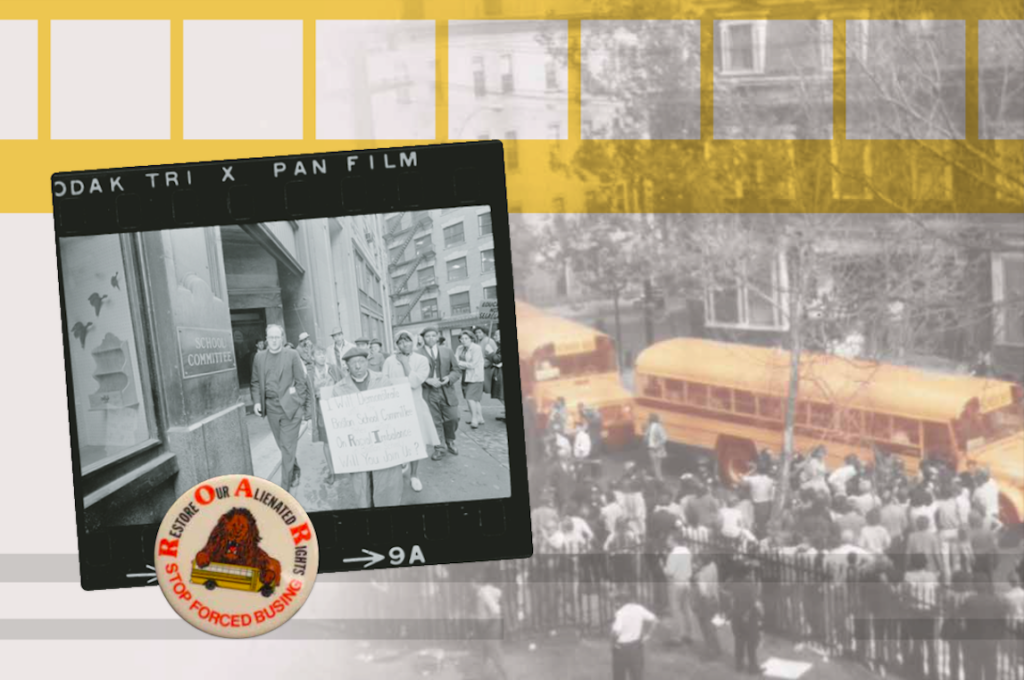Old State House Explores Boston’s History of Desegregation and Busing in New Exhibition

Opening September 1, interactive exhibit invites viewers to consider values of community, equality, and justice and how these notions cause harm when they conflict
For Immediate Release
Contact: Sloane Wilten
BOSTON — The new exhibit An Unfulfilled Promise: Desegregation and Busing in Boston opens at Boston’s Old State House on September 1, 2024. The exhibition, which chronicles Boston’s busing crisis during its 50th anniversary year, was curated by Revolutionary Spaces, which stewards the Old State House, and invites viewers to explore Boston’s divided landscape at that time through events that often unfolded steps from the building. The exhibit will present a collection of thought-provoking panels, images, and quotes from this era of educational reform and political turmoil. Visitors will get a glimpse into the opposition that broke out after the 1974 ruling that desegregated Boston’s schools, and trace the impact left on education practices and marginalized communities for decades to come.
“The Old State House was witness to some of the most famous incidents of the desegregation and busing era,” says Lou Rocco, Revolutionary Spaces Assistant Director of Visitor Experience & Accessibility Coordinator. “By sharing the history, images, and quotes from this controversial period, we can begin to understand that this was an incredibly complex and difficult situation for all Bostonians. We hope members of the public will engage with the nuance of this history, share their thoughts about it with us, and leave curious to learn more.”
The installation is an effort to not only memorialize the historic ruling as schools restart in September, but also to remind people of the conditions that necessitated it. It presents the pros and cons of the busing crisis, introduces the key players of the desegregation movement, and connects the history — looking back to post-WWII migration as it affected Boston’s Black population and forward to the continued struggles the local education system faces today. Guests will be asked to consider questions about justice and equality as they navigate the exhibit space and become better acquainted with beliefs held by both sides of the busing crisis.
Background on An Unfulfilled Promise
In his 1974 ruling on a case brought by 14 Black parents and 44 children in Boston, U.S. District Court Judge W. Arthur Garrity ordered the Boston Public School system to desegregate through busing after finding the Boston School Committee’s practices and policies unconstitutionally segregated students along racial lines. The decision ignited a political fire fueled by the city’s deep-rooted history of racial tension, disparity, and systemic oppression. During this time, the Old State House was the backdrop for anti-busing rallies organized by ROAR (Restore Our Alienated Rights) and pro-busing rallies organized by the Equal Rights League.
This year also marks the 70th anniversary of the U.S. Supreme Court’s landmark Brown v. Board of Education ruling that racial segregation in schools was unconstitutional.
ABOUT REVOLUTIONARY SPACES
Revolutionary Spaces stewards the historic Old South Meeting House and Old State House as landmarks, museums, and gathering spaces for the open exchange of ideas and the continuing practice of democracy. Viewing history as a powerful tool for today, Revolutionary Spaces brings people together to explore the American struggle to create and sustain a free society.
ABOUT THE OLD STATE HOUSE
The 1713 Old State House served as the seat of government for the province of Massachusetts during the Revolutionary era. Today, it is a museum and historic site offering tours, exhibits, and public programs exploring Boston’s Revolutionary-era history.
ABOUT THE OLD SOUTH MEETING HOUSE
The 1729 Old South Meeting House was a Congregational church and the largest gathering place for popular politics in Revolutionary Boston. Today it is a busy museum, treasured landmark, and active center for civic dialogue and free expression.

